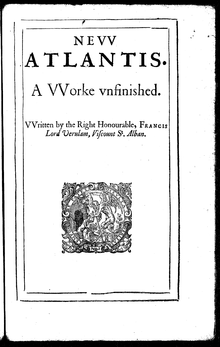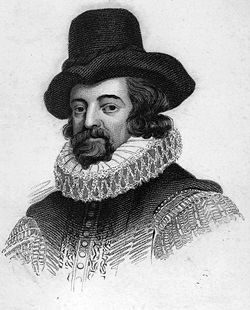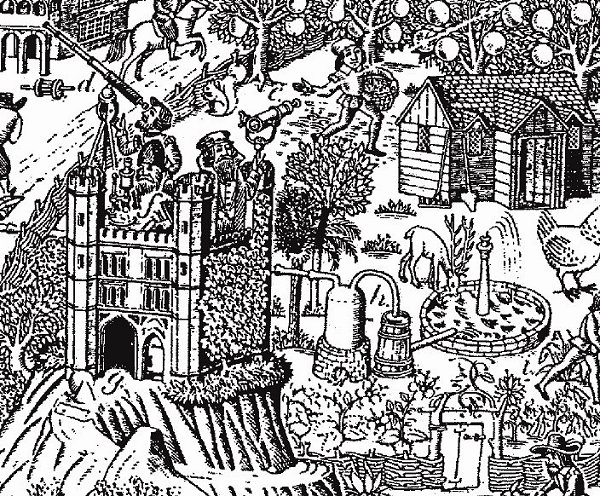Francis Bacon produced what I suppose one would call a “Utopian Novelette,” unfinished at about 22 pages, just three years before he died. It seems to have been intended as a kind of manifesto for the new scientific project he had, to a great extent, initiated, and so it is worth looking at retrospectively in the light of that project’s enormous success. The Kindle edition is also free, which is another incentive.
 The rough plot is that an English ship washes up on a secret island (or perhaps even an island continent) in which reason and science have produced something of an ideal society. One of the leaders of their scientific institution, “Salomon’s House,” comes to explain all the wonders their research has developed, of utility and benefit to mankind, and gives the narrator permission to publish the account “for the good of other nations,” at which point it peters out.
The rough plot is that an English ship washes up on a secret island (or perhaps even an island continent) in which reason and science have produced something of an ideal society. One of the leaders of their scientific institution, “Salomon’s House,” comes to explain all the wonders their research has developed, of utility and benefit to mankind, and gives the narrator permission to publish the account “for the good of other nations,” at which point it peters out.
The scientifically-orientated writer of the “Introductory Note” of my edition majors on how well Bacon anticipated the kind of things that science would be able to do. That is true, although much of the “chief-scientist’s” discourse is along the lines of, “we also have many kinds of things to eat and drink, only much finer than yours…” You kind of wonder exactly what good other nations will gain from this information other than, presumably, what Bacon intended in the way of encouraging people to imagine the possibilities of the new science and support it.
But to me the real interest is in digging beneath the “wonders” to Bacon’s deeper assumptions. That is particularly useful in the science-faith discussion, because Bacon wrote from a firm Christian commitment (albeit clearly deeply tainted by the concept of human mastery over creation – vivisection and the twisting of nature into artifice is among the wonders described). But the science of our own age has, as a matter of history, acquired a strongly secular, and sometimes overtly anti-religious, commitment and Christians seeking to do science “christianly” may benefit from comparing Bacon’s vision with how it worked out in practice.
Utopias, of course, describe the world as it ought to be, rather than as it is. My Introductory Notice questions how much Bacon actually believed his vision was achievable in the real Europe in which he dwelt. Still, it’s interesting that the first condition Bacon assumes for his ideal state is that it is a Christian (that is, uncorruptedly Christian) one. And therein lies the most obvious weakness in comparison to the actual scientific age around us.
 His scientists are philosopher-rulers, who investigate everything, but decide for themselves which discoveries are beneficial for release to the public, or to the king of the state. That assumes that none of their scientists will ever do anything for personal glory or gain. It assumes that the public will accept gratefully the guidance of their intellectuals, and never misuse what the latter beneficiently let them have – and it assumes that the intellectuals will never accidentally cause mayhem with the unforseen consequences of leaded petrol, pesticides, antibiotics or plastic. And it assumes that no king would ever even think of bribing or torturing the philosophers (practices with which Bacon was personally familiar as a Tudor and Stuart politician) to gain power over their subjects or start building empires.
His scientists are philosopher-rulers, who investigate everything, but decide for themselves which discoveries are beneficial for release to the public, or to the king of the state. That assumes that none of their scientists will ever do anything for personal glory or gain. It assumes that the public will accept gratefully the guidance of their intellectuals, and never misuse what the latter beneficiently let them have – and it assumes that the intellectuals will never accidentally cause mayhem with the unforseen consequences of leaded petrol, pesticides, antibiotics or plastic. And it assumes that no king would ever even think of bribing or torturing the philosophers (practices with which Bacon was personally familiar as a Tudor and Stuart politician) to gain power over their subjects or start building empires.
This is not unimportant, because Bacon rightly saw the power of science – but seeking power without a parallel and equally pragmatic program to transform human nature will lead to Hiroshima and climate change as sure as eggs is eggs. Yet Bacon’s failure to heed the Bible’s warnings on the character of the moral struggle during the last days is shared by many scientists, who still seems to claim naively that thy simply make the discoveries, and it’s not their fault what others so with them. In that sense The New Atlantis is as naive as H. G. Wells’s Things to Come.
Personally, though, I’m more interested in how the theistic nature of Bacon’s science maps to current concerns over methodological naturalism. One interesting passage in this respect is that, early on, the seafarers ask their hosts how this isolated nation came to be Christian. The Governor’s reply is that about twenty years after the Passion, a pillar of light surmounted by a cross, and surrounded by a force-field, suddenly appeared off the shore. After inspection by one of the “wise men, of the society of Salomon’s House” – think Albert Einstein, maybe, or Jerry Coyne – the latter responds in prayer:
“LORD God of heaven and earth, thou hast vouchsafed of thy grace to those of our order, to know thy works of Creation, and the secrets of them: and to discern (as far as appertaineth to the generations of men) between divine miracles, works of nature, works of art, and impostures and illusions of all sorts. I do here acknowledge and testify before this people, that the thing which we now see before our eyes is thy Finger and a true Miracle. And forasmuch as we learn in our books that thou never workest miracles, but to divine and excellent end, (for the laws of nature are thine own laws, and thou exceedest them not but upon great cause,) we most humbly beseech thee to prosper this great sign, and to give us the interpretation and use of it in mercy; which thou dost in some part secretly promise by sending it unto us.”
Now, there is certainly a flag waved for some kind of naturalism towards the end here, in the rarity and significance of nature’s laws being exceeded by God. But not only are such exceptions allowed in Bacon’s scientific world, but his “ideal scientist” has been trained to distinguish, apparently infallibly, the natural from the supernatural.
EDIT 5/5/19: This was actually pointed out in a Peaceful Science post by Bacon scholar Clinton Ohlers last July, a thread to which I contributed, though it must have slipped into my subconscious when I first drafted this piece:
In this work, Bacon also laid out his understanding of the relationship between scientific inquiry and divine action, in discerning a genuine miracle from an unusual work of nature or human artifice. His view was also the common understanding of the relationship between scientific inquiry and contemplation of divine action for the members of the Royal Society at its founding and for quite some time to come.
Compare that with scientists, professing Christianity, to whom a few years ago at BioLogos I set a test-case of a clearly miraculous laboratory transformation. I was told firmly that the true scientist would never give up the possibility of a “natural” csuse, even in the case of the resurrection. The scientists of Bacon’s utopia were less rigorous in their naturalism. What criteria did they use? Why are they forbidden to scientists now?
In the event it was hard, in the case in the New Atlantis, to deny a miracle, because the package delivered by the apparition even contained New Testament books that hadn’t yet been written. Bacon would not have done well discussing source-criticism in a modern department of biblical studies. But then Bacon didn’t actually have any experience of miracles even of a more modest, biblical pattern. Perhaps he didn’t think it worthwhile to produce real criteria for the miraculous, given cessationism.
But consider that firm distinction Bacon has made between the fixed laws of nature and the rare miraculous exceptions. Is that actually sustainable? I have argued in God’s Good Earth that is isn’t, biblically speaking: the cake of the world does not cut into “natural” and “supernatural” in that way. But Bacon fails to notice that the distinction is not consistent even in his own thinking. For the book begins with a brief account of how the seafarers are saved from dying at sea:
Yet we did lift up our hearts and voices to God above, who showeth his wonders in the deep, beseeching him of his mercy, that as in the beginning he discovered the face of the deep, and brought forth dry land, so he would now discover land to us, that we might not perish.
Their prayer is answered the very next day. Now if I had been Bacon’s protagonist, I’d have asked the “chief scientist” whether their astonishing deliverance in response to prayer was according to the laws of nature, which God “exceedeth not but upon great cause,” or whether it was God’s “Finger and a true miracle.”Such a wise and spiritual man would surely know. Perhaps that would have happened on the never-written page 23, but because it didn’t, we are stuck with a methodological naturalism that either ducks the question of providence, or downgrades it to make Bacon’s answer to prayer a mere superstitious interpretation of coincidence. But whilst it was a literary device to Bacon, it was one consistent with his doctrine of prayer and special providence.
I know that in the early days of the Royal Society, the question of special providence was much debated not to deny it, but to define its limits and its possible effects on science. I don’t think it resulted in anything like the infallible discernment of Bacon’s Chief Scientific Advisor. Neither do I think that “Baconian metaphysics” has been able to deal with the question adequately in the four centuries since, except by digging in its heels on the fundamental reality of naturalism. “Methodological naturalism is how it’s always been done (and we’ll stick our fingers in our ears if anyone mentions Francis Bacon’s views on miracles and providence.)”
To me it’s interesting that Bacon makes no attempt to justify such naturalism in theory, whilst denying it in practice in the application of his undoubted personal faith to the idealized situation of his New Atlantis. So it is his metaphysics, as well as his utopia, that was left unfinished. Who will complete the job?


I discovered this book a while back and tried to read it. I read a little and then lost interest.
Yes it was about Christian society in this area. it was interesting how much he anticapated scientific inventions/discoveries. It was like modern science fiction. maybe he should be in the SF originators. It was all about science having gone way ahead.
I wonder if he was saying LOOK how much could be done and don’t let anyone say its all been done. I doubt many people lived with a presumption that smart things were/could be done. That science would advance so much.
He did by the way include Jews as long as they had good motives. so it wasn’t all about christianity and anyways the protestant/catholic divide was very important in his day if not the divides between protestants.
Yeah – it was intended as a manifesto for the possibilities of science – though not finished and published after Bacon’s death. I’m also sure it forms a kind of template for, at least, early manifestations of Sci-Fi – something like Jules Verne’s Captain Nemo comes to mind.
In many ways Bacon comes across as a sympathetic and pious guy – as you say, he was ahead of his time in his attitude to the Jews (anticipating Cromwell in that). Yet he was also a politician involved in some quite brutal business, and even in New Atlantis the attitude to nature as an inferior enemy to be bent to human will comes across strongly.
Jon, remember when we discussed this with Clinton Ohlers, not long ago?
https://discourse.peacefulscience.org/t/clinton-ohlers-two-parables-on-divine-action/476/16?u=swamidass
How does this interact with his thoughts in this area?
Actually, I’d clean forgotten that thread – this piece was prompted by reviewing a previous Hump piece here for my Genealogical Adam book, and deciding to read the original.
But your link shows I did a cople of comments on that thread , so I’ll have to review it in the morning and see if there’s any correspondence with Clinton’s work.
Had time to review the major contributions of that thread before bed – surprised I’d completely forgotten the arguments, and even the thread, but that’s age for you.
I find I’m more sympathetic to Clinton’s starting position, on the “modernity” of the idea of the scientist’s inability to distinguish miracle, than to yours, Josh. Methodological naturalism was strictly limited in Bacon’s day.
But I still identify with the point I made in my rather late interjection there – the really interesting distinction in New Atlantis is the recognition of special providence, as distinct from miracle, which seems at odds with a watertight category of “natural” in Bacon’s thinking.
The other omission of relevance today (not sure without trawling the PS thread carefully whether I or anybody else mentioned it) is that Bacon’s knowledge of the world had no real interaction with creation, that is with “origins science.” His world is 5,600 years old, and includes spontaneous generation of lower animals as an entirely natural phenomenon. His House of Saloman is doing a lot of metallurgy and selective breeding, but no evolutionary biology, OoL science or geochronology.
But in a science that claimed to distinguish miracles, and special providence, where would Bacon have placed the transformation of species? Clearly there would be no prima facie case for him to assume it must be “natural” – but maybe, he’d be forced to define that term a litrtle more carefully than he does in New Atlantis.
The lesson for the believing scientist today, I suggest, is that that aspect of bacon’s “philosophy of science research programme” still needs to be done, if he/she believes in providence, and miracles, and creation, as Bacon did. It can’t be shelved under the kind of blanket “methodological naturalism” that would have the philosopher still investigating the boat and the pillar of light, rather than accepting the miracle and reading the gospel documents!